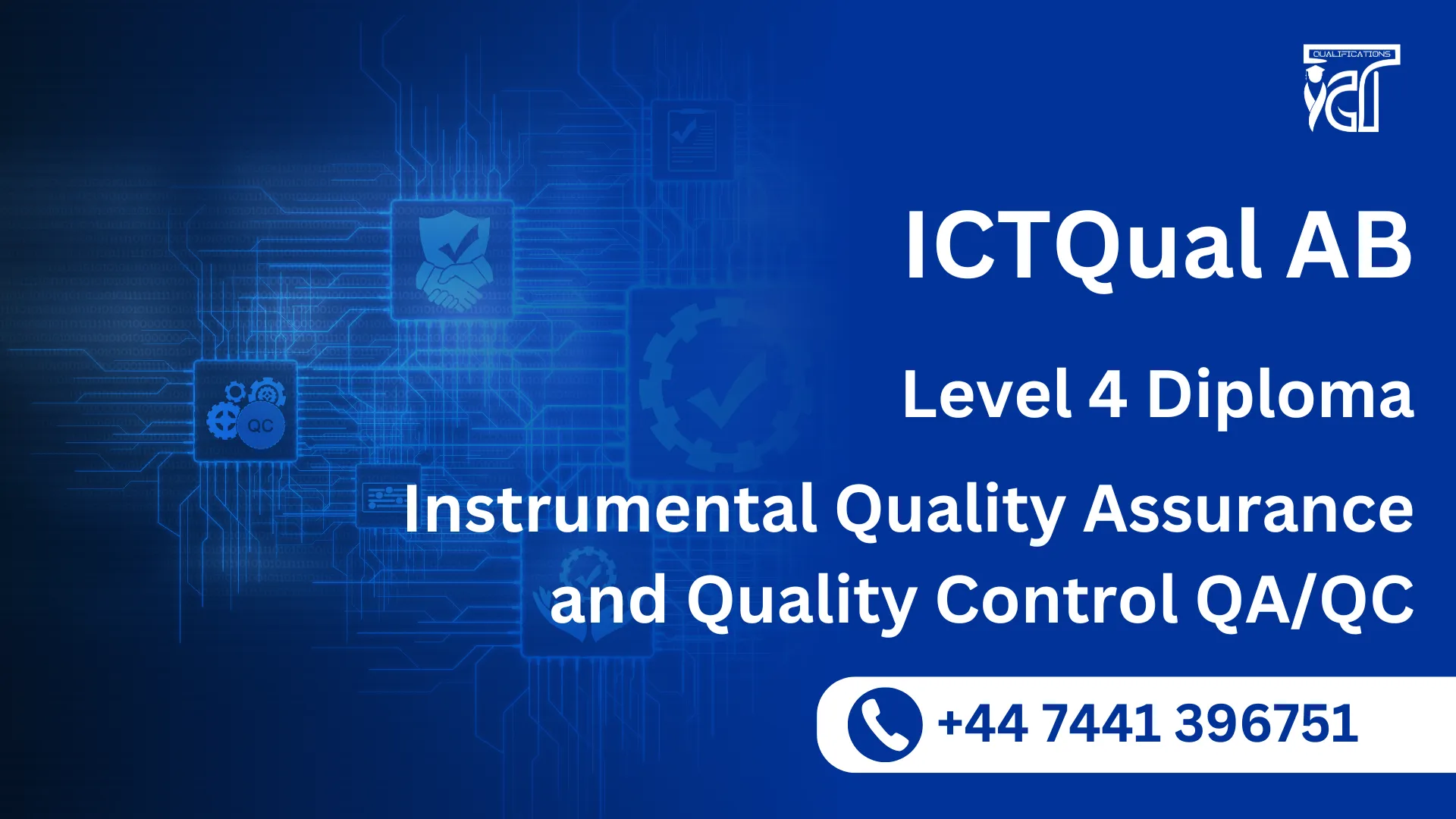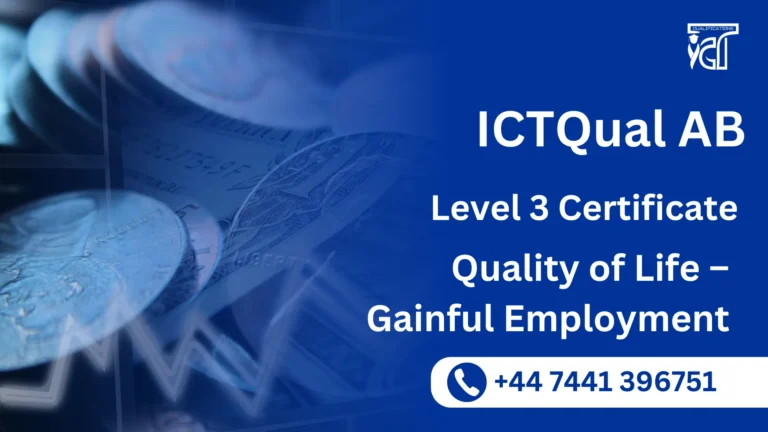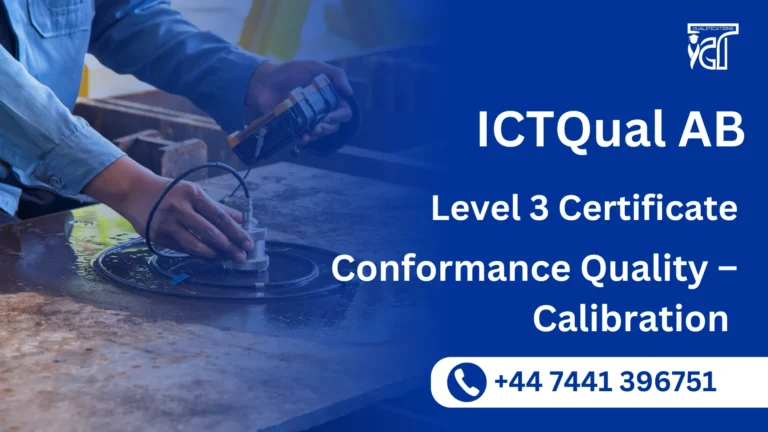The ICTQual AB Level 4 Diploma in Instrumental Quality Assurance and Quality Control (QA/QC) is a career‑oriented qualification designed to help learners establish or strengthen their expertise in industrial quality management. It introduces participants to the essential principles of QA/QC, focusing on inspection processes, calibration techniques, and compliance frameworks that ensure accuracy, safety, and reliability across technical environments.
This diploma blends theoretical learning with practical application, enabling learners to connect classroom knowledge with real industry practices. Participants gain exposure to international standards such as ISO, ASTM, API, and IEC, while also developing analytical and documentation skills that are critical for maintaining quality systems. The program emphasizes instrumental methods, material management, and inspection strategies, ensuring learners are capable of supporting organizational quality objectives.
By completing this qualification, learners will be well‑prepared for roles such as QA/QC Technician, Quality Inspector, or Compliance Assistant. The diploma also serves as a progression pathway toward advanced qualifications, including Level 5 Diplomas and specialized QA/QC certifications, offering international recognition and career mobility.
Ultimately, the ICTQual AB Level 4 Diploma equips learners with the confidence, technical knowledge, and practical skills to contribute effectively to QA/QC teams and projects, making it an excellent starting point for a successful career in quality assurance and control.
ICTQual AB Level 4 Diploma in Instrumental Quality Assurance and Quality Control QA/QC
This qualification, the ICTQual AB Level 4 Diploma in Instrumental Quality Assurance and Quality Control QA/QC, consists of 6 mandatory units.
| Sr# | Unit Title |
| 1 | Developing and Applying ITPs in Instrumentation Projects |
| 2 | Inspection Checklists and Documentation for Compliance |
| 3 | Material Receiving, Handling, and Preservation Procedures |
| 4 | Application of NEC‑250 Grounding and NEMA VE‑1/VE‑2 Cable Tray Standards |
| 5 | Installation Practices for Conduits (RMS, FMT, RGS, IMT – NEC Articles 344–400) |
| 6 | Intermediate Loop Checking, Testing, and Commissioning Techniques |
Learning Outcomes for the ICTQual AB Level 4 Diploma in Instrumental Quality Assurance and Quality Control QA/QC:
1. Developing and Applying ITPs in Instrumentation Projects
- Explain the purpose and structure of Inspection Test Plans (ITPs).
- Develop ITPs tailored to instrumentation projects.
- Identify inspection stages and assign responsibilities within an ITP.
- Apply ITPs to monitor compliance with project specifications.
- Integrate ITPs with project schedules and QA/QC documentation.
- Evaluate the effectiveness of ITPs in ensuring quality outcomes.
- Revise and update ITPs based on project changes or non‑conformances.
- Demonstrate the ability to communicate ITP requirements to project teams.
2. Inspection Checklists and Documentation for Compliance
- Design inspection checklists for different stages of instrumentation projects.
- Apply checklists to verify compliance with technical standards.
- Record inspection findings accurately and systematically.
- Identify non‑conformances and document corrective actions.
- Maintain traceability of inspection records for audits.
- Use checklists to support quality assurance and risk management.
- Ensure documentation meets international QA/QC requirements.
- Demonstrate effective reporting and communication of inspection results.
3. Material Receiving, Handling, and Preservation Procedures
- Inspect incoming materials against purchase orders and specifications.
- Verify material certificates and compliance documentation.
- Apply correct procedures for safe receiving and handling of materials.
- Implement preservation methods to protect sensitive instrumentation equipment.
- Identify and report non‑conforming materials.
- Maintain traceability of materials throughout the project lifecycle.
- Ensure compliance with international best practices for storage and preservation.
- Document material inspections and preservation activities accurately.
4. Application of NEC 250 Grounding and NEMA VE 1/VE 2 Cable Tray Standards
- Interpret NEC 250 grounding requirements for instrumentation systems.
- Apply NEMA VE‑1/VE‑2 standards for cable tray design and installation.
- Inspect grounding systems for compliance with safety standards.
- Verify cable tray installations against NEMA specifications.
- Identify common grounding and cable tray installation faults.
- Document inspections in line with NEC and NEMA requirements.
- Ensure installations meet safety, reliability, and compliance standards.
- Communicate findings and corrective actions effectively.
5. Installation Practices for Conduits (RMS, FMT, RGS, IMT – NEC Articles 344–400)
- Interpret NEC Articles 344–400 for conduit installations.
- Select appropriate conduit types (RMS, FMT, RGS, IMT) for specific applications.
- Inspect conduit installations for compliance with NEC standards.
- Identify and correct common conduit installation issues.
- Apply QA/QC procedures to conduit routing and support systems.
- Document inspections and ensure traceability of conduit work.
- Ensure conduit installations meet safety and operational requirements.
- Demonstrate compliance with international best practices.
6. Intermediate Loop Checking, Testing, and Commissioning Techniques
- Explain the purpose of loop checking in instrumentation systems.
- Perform loop checks to verify continuity and functionality.
- Document loop check results in accordance with QA/QC requirements.
- Conduct intermediate testing procedures for instrumentation systems.
- Apply commissioning techniques to ensure system readiness.
- Identify and resolve issues during loop checking and commissioning.
- Ensure compliance with international standards during commissioning.
- Contribute to safe and effective handover of commissioned systems.
The ICTQual AB Level 4 Diploma in Instrumental Quality Assurance and Quality Control (QA/QC) is designed to provide learners with a solid entry‑level foundation in quality systems. It introduces essential principles of inspection, calibration, and compliance, helping participants build the technical and practical skills required to begin or strengthen their careers in QA/QC across diverse industries.
Technical Knowledge
- Foundational QA/QC principles: Gain a clear understanding of assurance and control basics.
- Instrumental techniques: Learn calibration, inspection, and testing methods used in industry.
- Compliance frameworks: Introduction to ISO, ASTM, API, and IEC standards.
- Documentation skills: Training in reporting, record‑keeping, and inspection checklists.
Career Development
- Entry‑level opportunities: Prepare for roles such as QA/QC Technician, Quality Inspector, or Compliance Assistant.
- Industry relevance: Skills applicable in manufacturing, oil & gas, pharmaceuticals, and engineering.
- Progression pathways: Eligibility to advance into Level 5 Diplomas or specialized QA/QC certifications.
- Global recognition: Qualification respected internationally for career mobility.
Professional Skills
- Analytical ability: Develop problem‑solving skills to identify and resolve quality issues.
- Risk awareness: Understand corrective action planning and safety considerations.
- Team contribution: Learn to support QA/QC teams effectively.
- Continuous improvement mindset: Foster reliability and efficiency in industrial processes.
Organizational Impact
- Enhanced compliance: Contribute to meeting international quality standards.
- Improved efficiency: Help reduce errors and streamline inspection processes.
- Quality culture: Support organizational goals of reliability and innovation.
- Industry competitiveness: Strengthen organizational standing in global markets
ICTQual AB Level 4 Diploma in Instrumental Quality Assurance and Quality Control QA/QC is tailored for individuals who want to establish a strong base in QA/QC practices with a focus on instrumental techniques. It is suitable for those entering the quality assurance field for the first time, as well as professionals already working in technical industries who wish to enhance their expertise and career prospects.
Learners with Technical Interests
- Aspiring QA/QC technicians: Individuals aiming to start a career in quality assurance and control.
- Technical staff: Workers in civil, mechanical, electrical, or industrial fields seeking QA/QC knowledge.
- Manufacturing employees: Those involved in production or fabrication who want to strengthen inspection skills.
- Oil & gas professionals: Candidates looking to build compliance and safety expertise.
- Pharmaceutical and healthcare staff: Learners working in regulated industries requiring strict quality standards.
Career‑Focused Participants
- Entry‑level professionals: Those seeking their first formal qualification in QA/QC.
- Compliance assistants: Staff supporting documentation and inspection processes.
- Junior inspectors: Individuals aiming to progress into supervisory roles.
- Project support staff: Learners involved in QA/QC aspects of industrial projects.
- Audit trainees: Candidates preparing for inspection and certification responsibilities.
Global Learners & Career Changers
- International learners: Candidates seeking globally recognized qualifications.
- Career changers: Professionals transitioning into QA/QC from related technical fields.
- Continuous learners: Individuals committed to professional development.
- Industry consultants: Those preparing to advise organizations on quality frameworks.
- Future leaders: Learners aspiring to management roles in QA/QC.
Organizational & Industry‑Driven Learners
- Corporate employees: Sponsored by organizations to strengthen QA/QC capacity.
- Industrial trainers: Preparing to mentor or train QA/QC teams.
- Risk management staff: Focused on safety, reliability, and corrective action planning.
- Process improvement specialists: Driving efficiency and innovation in operations.
- Compliance professionals: Ensuring adherence to ISO, ASTM, API, and IEC standards.
The ICTQual AB Level 4 Diploma in Instrumental QA/QC serves as a strong foundation for learners entering the field of quality assurance and control. It not only equips participants with essential technical and compliance skills but also opens clear pathways for academic advancement, professional certifications, and career growth across industries worldwide.
Academic Progression
- Level 5 Diplomas in QA/QC: Learners can advance to the ICTQual AB Level 5 Diploma in Instrumental QA/QC, which deepens technical and managerial expertise.
- Specialized QA/QC programs: Options include diplomas in piping, welding, or instrumentation QA/QC tailored to industry needs.
- Advanced technical studies: Access to higher‑level qualifications in engineering management, industrial quality systems, or aviation QA/QC.
- International recognition: The diploma provides eligibility for study with global institutions offering advanced QA/QC programs.
Professional Certifications
- ISO auditor training: Certification to conduct audits aligned with ISO standards.
- Industry‑specific credentials: Compliance certifications for oil & gas, pharmaceuticals, or manufacturing.
- Risk management certifications: Training in safety, reliability, and corrective action planning.
- Professional memberships: Access to international QA/QC and engineering associations.
Career Advancement
- QA/QC Technician: Entry into specialized inspection and compliance roles.
- Quality Inspector: Supervisory positions ensuring adherence to standards.
- Compliance Officer: Roles focused on documentation and regulatory frameworks.
- Project QA/QC Coordinator: Managing quality aspects of industrial projects.
- Consultant roles: Advising organizations on quality frameworks and compliance strategies.
Industry Opportunities
- Manufacturing sector: QA/QC roles in production and fabrication.
- Oil & gas industry: Advanced inspection and compliance positions.
- Pharmaceuticals: Quality leadership in regulated healthcare environments.
- Civil and mechanical engineering: Supervisory roles in construction and infrastructure projects.
- Global mobility: Opportunities to work internationally with recognized qualifications.
Entry Requirements
Learners must meet the following criteria to be considered for admission into the course:
- Age Requirement: Applicants must be at least 18 at the time of enrollment.
- Educational Background: Completion of basic education is required. Helpful in fields such as civil, mechanical, electrical, or industrial engineering.
- Work Experience: This diploma is designed as an entry‑level qualification. Practical involvement in inspection, compliance, or technical projects strengthens eligibility.
- English Language Proficiency: Ensures learners can engage with technical materials and assessments. May be required through IELTS, TOEFL, or equivalent certifications for non‑native speakers.
Register Now
Qualification Process
Qualification Process for the ICTQual AB Level 4 Diploma in Instrumental Quality Assurance and Quality Control QA/QC
- Self-Assessment:
Begin by evaluating your eligibility to ensure you meet the qualification requirements, including work experience, knowledge, and language proficiency. - Registration:
Complete your registration by submitting the required documents, including a scanned copy of a valid ID, and paying the registration fee. - Induction:
An assessor will conduct an induction to confirm your eligibility for the course and explain the evidence requirements. If you do not meet the criteria, your registration will be cancelled, and the fee will be refunded. - Assignments & Evidence Submission:
Provide all assignments and the necessary evidence based on the assessment criteria outlined in the course. If you are unsure of the required evidence, consult with the assessor for guidance on the type and nature of evidence needed. - Feedback and Revision:
The assessor will review your submitted evidence and provide feedback. Evidence that meets the criteria will be marked as “Criteria Met,” while any gaps will be identified. You will be asked to revise and resubmit if needed. - Competence Evidence:
Submit final evidence demonstrating that all learning outcomes have been met. This evidence will be marked as “Criteria Met” by the assessor once it is satisfactory. - Internal Quality Assurance (IQA):
The Internal Quality Assurance Verifier (IQA) will review your evidence to ensure consistency, quality, and compliance with standards. - External Verification:
The IQA will submit your portfolio to ICTQUAL AB External Quality Assurance Verifiers (EQA) for final confirmation. The EQA may contact you directly to verify the authenticity of your evidence. - Certification:
Upon successful completion of all checks, ICTQUAL AB will issue your official certificate, confirming that you have attained the ICTQual AB Level 4 Diploma in Instrumental Quality Assurance and Quality Control QA/QC






